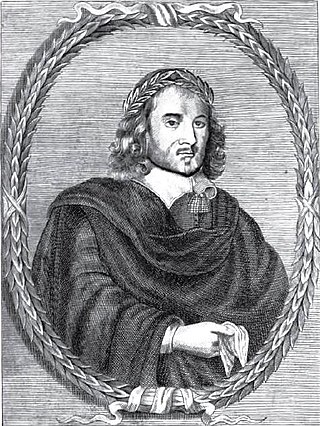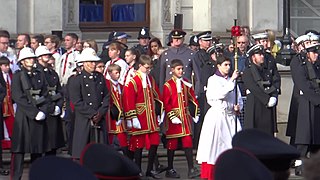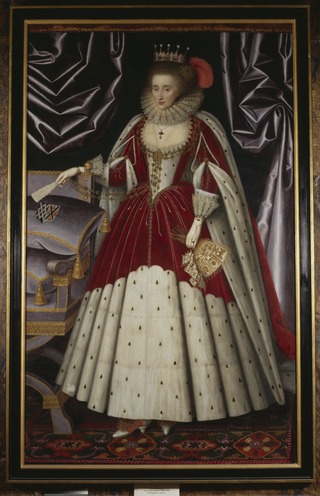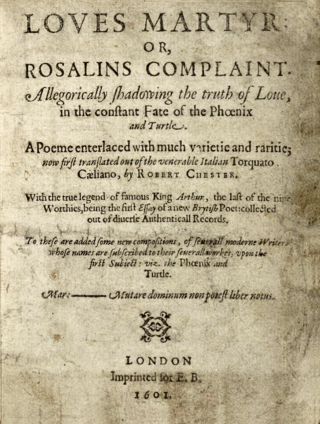This article relies largely or entirely on a single source .(September 2013) |
William Barksted (fl. 1611) was an English actor and poet.
This article relies largely or entirely on a single source .(September 2013) |
William Barksted (fl. 1611) was an English actor and poet.
William Barksted in 1609 performed in Ben Jonson's Epicene, and in 1613 in Beaumont and Fletcher's Coxcomb. When he performed in Epicene he was of the company "provided and kept" by Kirkham, Hawkins, Kendall, and Payne, and in Jonson's folio of 1616 he is associated with "Nat. Field, Gil. Carie, Hugh Attawel, Joh. Smith, Will Pen, Ric. Allen, and Joh. Blaney." This company of actors, in the reign of Elizabeth the "children of the chapel", under James I was the "children of the queen's revels"; but on the title-page of Hiren it is "his Maiesties", not the "queen's" revels, so that the designation may have varied. Certain documents (a bond and articles of agreement in connection with Philip Henslowe and Edward Alleyn) introduce Barksted's name in 1611 and 1615–16, as belonging to this company of actors referred.
Nothing later concerning him has been discovered, except an anecdote worked into the Wit and Mirth of John Taylor, the Water Poet, in 1629. In some copies also of the Insatiate Countess, dated 1631, the name of John Marston is displaced by that of William Barksted. It was possibly as actor that he became acquainted with Henry, earl of Oxford, and Elizabeth, countess of Derby. The former he calls, in the verse-dedication of Hiren, "the Heroicke Heroes". The Countess of Derby is addressed as "Your honor's from youth oblig'd".’
Barksted was the author of the poems Mirrha, the Mother of Adonis; or Lustes Prodegies (1607); and Hiren, or the Faire Greeke (1611). On the title-page of the latter, he describes himself as "one of the servants of his Maiesties Revels". There is a "Prologue to a playe to the cuntry people" in Ashmole MS. 38 (art. 198), which William Carew Hazlitt attributed to Barksted, that is signed "William Buckstead, Comedian". Such unhappily is the little personal fact that research has yielded.
Barksted has been identified by some with W. B., the author of a rough verse-translation of a "Satire of Juvenal", entitled That which seems Best is Worst, exprest in a paraphrastical transcript of Iuvenal's tenth Satyre. Together with the Tragicall Narration of Virginius's Death interserted, London, 1617. This is a paraphrase resembling in method Barksted's Mirrha, which is paraphrased from the tenth book of Ovid's Metamorphoses .
Both Mirrha and Hiren owe much to "Venus and Adonis", and their author pays the following tribute to Shakespeare at the close of Mirrha:—

Benjamin Jonson was an English playwright and poet. Jonson's artistry exerted a lasting influence on English poetry and stage comedy. He popularised the comedy of humours; he is best known for the satirical plays Every Man in His Humour (1598), Volpone, or The Fox, The Alchemist (1610) and Bartholomew Fair (1614) and for his lyric and epigrammatic poetry. "He is generally regarded as the second most important English dramatist, after William Shakespeare, during the reign of James I."

Thomas Middleton was an English Jacobean playwright and poet. He, with John Fletcher and Ben Jonson, was among the most successful and prolific of playwrights at work in the Jacobean period, and among the few to gain equal success in comedy and tragedy. He was also a prolific writer of masques and pageants.

William Shakespeare (1564–1616) wrote sonnets on a variety of themes. When discussing or referring to Shakespeare's sonnets, it is almost always a reference to the 154 sonnets that were first published all together in a quarto in 1609. However, there are six additional sonnets that Shakespeare wrote and included in the plays Romeo and Juliet, Henry V and Love's Labour's Lost. There is also a partial sonnet found in the play Edward III.

John Lyly was an English writer, playwright, courtier, and parliamentarian. He was best known during his lifetime for his two books Euphues: The Anatomy of Wit (1578) and its sequel Euphues and His England (1580), but is perhaps best remembered now for his eight surviving plays, at least six of which were performed before Queen Elizabeth I. Lyly's distinctive and much imitated literary style, named after the title character of his two books, is known as euphuism. He is sometimes grouped with other professional dramatists of the 1580s and 1590s like Christopher Marlowe, Robert Greene, Thomas Nashe, George Peele, and Thomas Lodge, as one of the so-called University Wits. He has been credited by some scholars with writing the first English novel, and as being 'the father of English comedy'.

The Mermaid Tavern was a tavern on Cheapside in London during the Elizabethan era, located east of St. Paul's Cathedral on the corner of Friday Street and Bread Street. It was the site of the so-called "Fraternity of Sireniacal Gentlemen", a drinking club that met on the first Friday of every month that included some of the Elizabethan era's leading literary figures, among them Ben Jonson, John Donne, John Fletcher and Francis Beaumont, Thomas Coryat, John Selden, Robert Bruce Cotton, Richard Carew, Richard Martin, and William Strachey. A popular tradition has grown up that the group included William Shakespeare, although most scholars think that was improbable.
William Strachey was an English writer whose works are among the primary sources for the early history of the English colonisation of North America. He is best remembered today as the eye-witness reporter of the 1609 shipwreck on the uninhabited island of Bermuda of the colonial ship Sea Venture, which was caught in a hurricane while sailing to Virginia. The survivors eventually reached Virginia after building two small ships during the ten months they spent on the island. His account of the incident and of the Virginia colony is thought by most Shakespearean scholars to have been a source for Shakespeare's play The Tempest.

The Whitefriars Theatre was a theatre in Jacobean London, in existence from 1608 to the 1620s — about which only limited and sometimes contradictory information survives.

The Children of the Chapel are the boys with unbroken voices, choristers, who form part of the Chapel Royal, the body of singers and priests serving the spiritual needs of their sovereign wherever they were called upon to do so. They were overseen by the Master of the Children of the Chapel Royal.
Cynthia's Revels, or The Fountain of Self-Love is a late Elizabethan stage play, a satire written by Ben Jonson. The play was one element in the Poetomachia or War of the Theatres between Jonson and rival playwrights John Marston and Thomas Dekker.

Lucy Russell, Countess of Bedford was a major aristocratic patron of the arts and literature in the Elizabethan and Jacobean eras, the primary non-royal performer in contemporary court masques, a letter-writer, and a poet. She was an adventurer (shareholder) in the Somers Isles Company, investing in Bermuda, where Harrington Sound is named after her.

Robert Chester is the mysterious author of the poem Love's Martyr which was published in 1601 as the main poem in a collection which also included much shorter poems by William Shakespeare, Ben Jonson, George Chapman and John Marston, along with the anonymous "Vatum Chorus" and "Ignoto".
Events from the 1590s in England.
Thomas Bancroft was a minor seventeenth-century English poet, He wrote a number of poems and epigrams addressed to notable people into which he embedded clever puns.
William Stansby (1572–1638) was a London printer and publisher of the Jacobean and Caroline eras, working under his own name from 1610. One of the most prolific printers of his time, Stansby is best remembered for publishing the landmark first folio collection of the works of Ben Jonson in 1616.
The Insatiate Countess is an early Jacobean era stage play, a tragedy first published in 1613. The play is a problematic element in John Marston's dramatic canon.
"To the Queen" is a short 18 line poem praising Queen Elizabeth I attributed to William Shakespeare. It was included in 2007 by Jonathan Bate in his complete Shakespeare edition for the Royal Shakespeare Company.

Richard Martin (1570–1618) was an English lawyer, orator, and supporter of the Virginia Company who was appointed Recorder of the City of London at the recommendation of James I of England in 1618 but died shortly thereafter.
Cecily Bulstrode was a courtier and subject of poetry. She was the daughter of Edward Bulstrode (1550–1595) and Cecily Croke; she was a cousin of Lucy Russell, Countess of Bedford, in whose household she was a member in 1605. Two years later, she served as a Gentlewoman of the Bedchamber to Anne of Denmark.
Lewis Machin was an English poet and playwright in the early 17th century. He may have worked with Gervase Markham on the play The Dumb Knight around 1601, although it is now argued that instead Machin revised Markham's original around 1608-09.

The Shakespeare authorship question is the argument that someone other than William Shakespeare of Stratford-upon-Avon wrote the works attributed to him. Anti-Stratfordians—a collective term for adherents of the various alternative-authorship theories—believe that Shakespeare of Stratford was a front to shield the identity of the real author or authors, who for some reason—usually social rank, state security, or gender—did not want or could not accept public credit. Although the idea has attracted much public interest, all but a few Shakespeare scholars and literary historians consider it a fringe theory, and for the most part acknowledge it only to rebut or disparage the claims.
![]() This article incorporates text from a publication now in the public domain : Stephen, Leslie, ed. (1885). "Barksted, William". Dictionary of National Biography . Vol. 3. London: Smith, Elder & Co.
This article incorporates text from a publication now in the public domain : Stephen, Leslie, ed. (1885). "Barksted, William". Dictionary of National Biography . Vol. 3. London: Smith, Elder & Co.